Presented by the
Newfoundland's Grand Banks Site
to assist you in researching your Family History
Click on the graphic below to return to the NGB Home Page
To contribute to this site, see above menu item "About".
These transcriptions may contain human errors.
As always, confirm these, as you would any other source material.
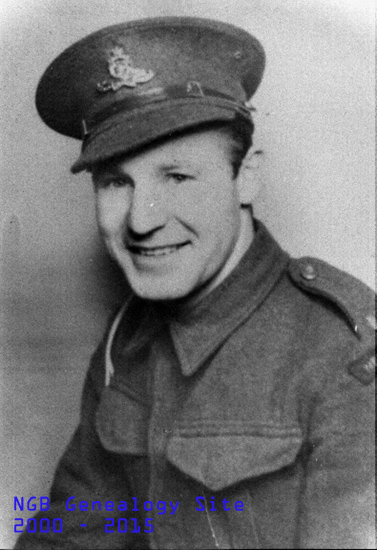 |
|
Gunner John Patrick Joseph March
166th [Newfoundland] Field Artillery Regimental # 971114 ~ Donated by John March and Rosarii March-Pearce |
An edited version of Dad’s wartime service 1939 – 45. As a brief note on his joining up and departing for England, He enlisted sometime in 1940 and departed for England in April of 1940 ( the reason I know this date they used to bug me that he left for war and left me in the cupboard ( Mom was pregnant on me at the time). I got a lot of ribbing over this when he got home after the war.. To continue, he went to England for training for a year or so and then went to North Africa with the British 8th Army. The following will give you some idea of what they went thru for almost 5 years and from what I read about it, it was pure hell!! This will be in some sort of chronological order. 1 -British 8th Army in the North African campaign 1940 – 43 , The 166th Royal artillery partook in this campaign and our father (Jack March) was part of this campaign. See below; Tobruk's garrison—although isolated by land—continued to receive supplies and support from the Royal Navy, and Rommel was unable to take the port. This failure was significant; his front line positions at Sollum were at the end of an extended supply chain that stretched back to Tripoli and was threatened by the Tobruk garrison,[42] and the substantial commitment required to invest Tobruk prevented him from building up his forces at Sollum, making further advances into Egypt impractical.[43][44] The Allies had regained the initiative by maintaining possession of Tobruk.[44] The inaction of both sides would, however, not last for much longer. The Allied Forces soon after launched a small attack, Operation Brevity, in an attempt to push the Axis forces back over the border. Brevity was followed up by a larger scale offensive, Operation Battleaxe, intended to relieve the siege at Tobruk; this operation also failed. British Crusader tanks moving to forward positions in the Western Desert on 26 November 2 -Sicilian campaign 1943 , The 166th Royal artillery partook in this campaign and our father (Jack March) was part of this campaign. The Allied invasion of Sicily, codenamed Operation Husky, was a major World War II campaign, in which the Allies took Sicily from the Axis (Italy and Nazi Germany). It was a large scale amphibious and airborne operation, followed by six weeks of land combat. It launched the Italian Campaign. Husky began on the night of 9–10 July 1943, and ended 17 August. Strategically, Husky achieved the goals set out for it by Allied planners. The Allies drove Axis air, land and naval forces from the island; the Mediterranean's sea lanes were opened and Italian dictator Benito Mussolini was toppled from power. It opened the way to the Allied invasion of Italy. 3 - Sicilian campaign2 1943 , The Allied invasion of Sicily in July 1943, codenamed Operation Husky, was highly successful, although many of the Axis forces managed to avoid capture and escape to the mainland. To the Axis, this was viewed as a success. More importantly in late July a coup deposed Benito Mussolini as head of the Italian government, which then began approaching the Allies to make peace. It was believed a quick invasion of Italy might hasten an Italian surrender and produce quick military victories over the German troops that could be trapped fighting in a hostile country. However, Italian (and more so German) resistance proved relatively strong, and fighting in Italy continued even after the fall of Berlin. In addition, the invasion left the Allies in a position of supplying food and supplies to conquered territory, a burden which would otherwise have fallen on Germany. As well, Italy occupied by a hostile German army would have created additional problems for the German Commander-in-Chief Albert Kesselring. 4 – The Italian campaign 1943 – 45 , The 166th Royal artillery partook in this campaign and our father (Jack March) was part of this campaign. The Allied invasion of Italy was the Allied landing on mainland Italy on September 3, 1943, by General Harold Alexander's 15th Army Group (comprising Lieutenant General Mark Clark's U.S. Fifth Army and General Bernard Montgomery's British Eighth Army) during the Second World War. The operation followed the successful invasion of Sicily during the Italian Campaign. The main invasion force landed around Salerno on the western coast in Operation Avalanche, while two supporting operations took place in Calabria (Operation Baytown) and Taranto (Operation Slapstick). 5 - Operation Baytown, The 166th Royal artillery partook in this campaign and our father (Jack March) was part of this campaign. The 166th Royal artillery partook in this campaign and our father (Jack March) was part of this campaign..See below, This was the preliminary step in the plan in which Eighth Army, under General Bernard Montgomery would depart from the port of Messina on Sicily, to cross the Straits of Messina and land near the tip of Calabria (the "toe" of Italy), on 3 September 1943. The short distance from Sicily meant landing craft could launch from there directly, rather than be carried by ship. V British Corps' 5th Infantry Division would land on the north side of the "toe" while its 1st Canadian Infantry Division would land at Cape Spartivento on the south side. General Montgomery was strongly opposed to Operation Baytown. He predicted it would be a waste of effort since it assumed the Germans would give battle in Calabria; if they failed to do so, the diversion would not work, and the only effect of the operation would be to place the Eighth Army 300 mi (480 km) south of the main landing at Salerno. He was proved correct; after Operation Baytown the Eighth Army marched 300 miles north to the Salerno area against no opposition other than engineer obstacles. Progress was slow as demolished bridges, roadblocks and mines delayed Eighth Army. The nature of the countryside in the toe of Italy made it impossible to by-pass obstacles and so the Allies' speed of advance was entirely dependent on the rate at which their engineers could clear obstructions.[16] Thus, Montgomery's objections to the operation were proved correct: the Eighth Army could not tie down German units that refused battle and the main obstacle to their advance was the terrain and German demolitions of roads and bridges. They cont’d. on and helped liberate Rome in June 1944. Dad and crew stayed in Italy until the end of the war in 1945.. Coming home, I believe they came home in Sept. or Oct. of 1945)..I remember going with a number of people to the Railway station on Water St. and welcoming him home (I was about 5 yrs. old at the time). Note: The above info is to the best of my recollection of chats I had with him ( a bit of humor here, the 166th were bugged by another Newfoundland Regiment called the 59th Heavy Artillery Regiment.. They went to Europe on or about D Day and continued on up western Europe to Berlin in May of 1945. The 59th did not see battle in the North Africa and Italy, but they called the 166th the D-Day dodgers.... |
Photos of John during his service in WW II:
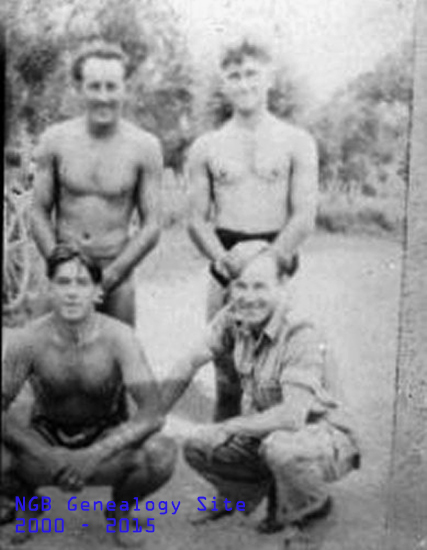 |
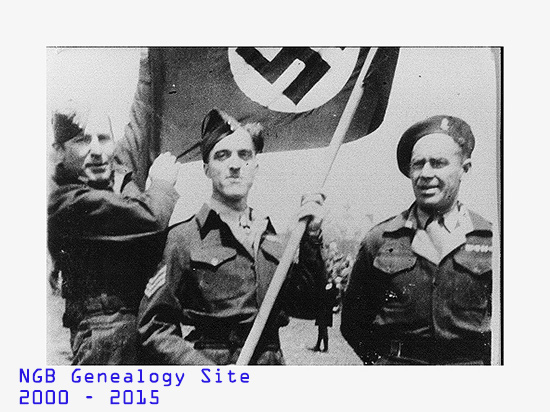 |
|
Jack March with Conrades in Italy [front right]
|
Jack [far left] and Conrades taking down the German
flag
|
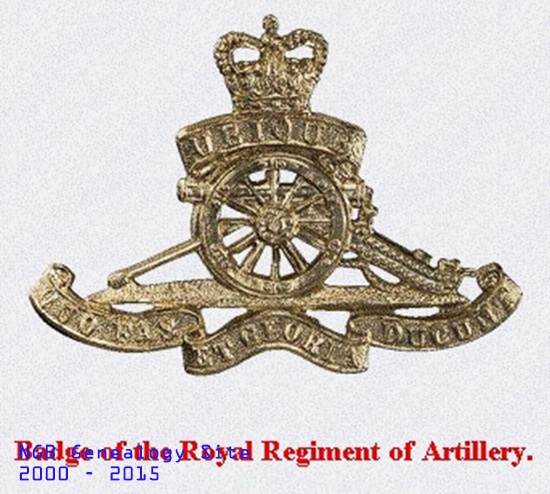 |
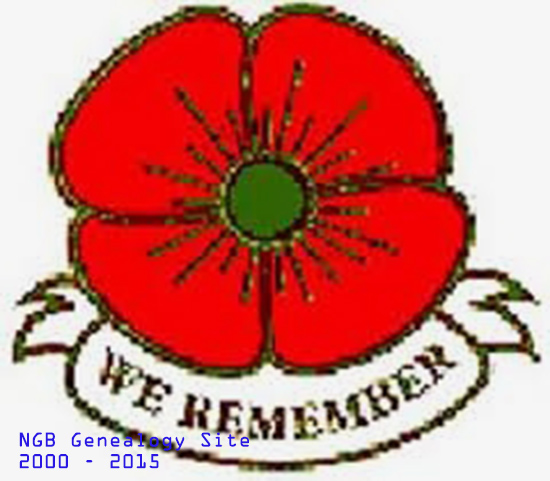 |
|
Artillery cap badge
|
The Poppy
|
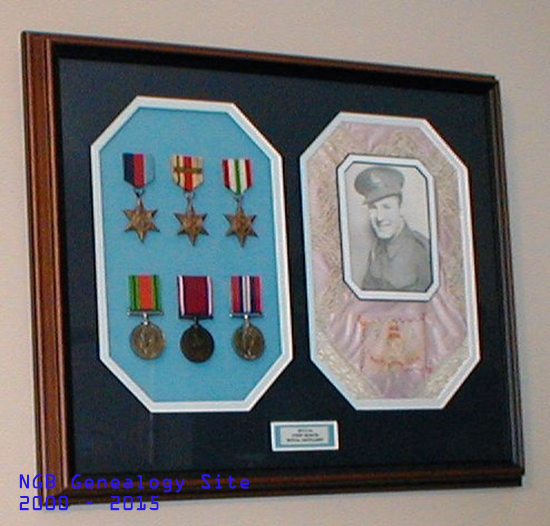 |
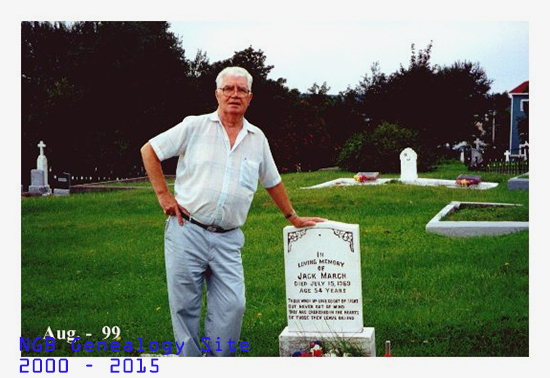 |
|
Jack's World War II medals
|
Kevin O'Neill [WW II Vet] at Jack's grave site
In Loving Memory of Jack March Died July 15, 1969 Age 54 years |
Return to the Contributed Records
Return to the Main Military Records Index
Military Records Contact: Sherwin Flight
Newfoundland's Grand Banks is a non-profit endeavor.
No part of this project may be reproduced in any form
for any purpose other than personal use.
JavaScript DHTML Menu Powered by Milonic
© Newfoundland's Grand Banks (1999-2025)
Hosted by
![]()
Your Community, Online!
![[Recent]](../../recent.gif)
![[Home]](../../home.gif)